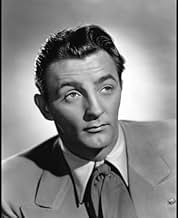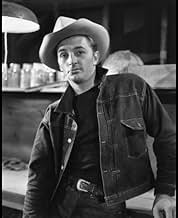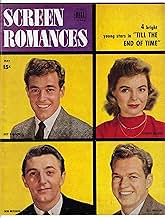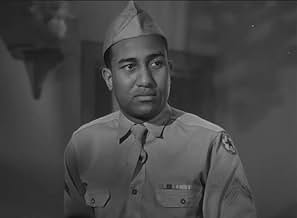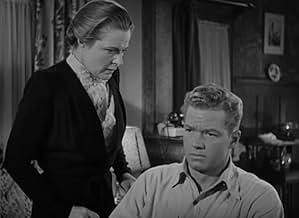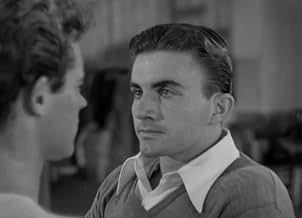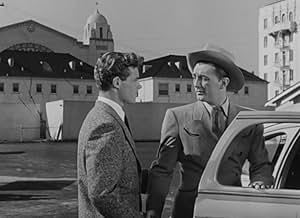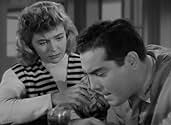NOTE IMDb
6,7/10
1,7 k
MA NOTE
Ajouter une intrigue dans votre langueDrama about former WW2 Marines readjusting to civilian life and dealing with their mental and physical traumas.Drama about former WW2 Marines readjusting to civilian life and dealing with their mental and physical traumas.Drama about former WW2 Marines readjusting to civilian life and dealing with their mental and physical traumas.
- Réalisation
- Scénario
- Casting principal
- Récompenses
- 4 victoires au total
Harry von Zell
- Scuffy
- (as Harry Von Zell)
John Bailey
- Interviewer
- (non crédité)
Bobby Barber
- Arcade Game Player in Saloon
- (non crédité)
Bill Barnum
- Jackson
- (non crédité)
Dick Benjamin
- Sergeant
- (non crédité)
Paul Birch
- Marine Wanting Farm
- (non crédité)
Avis à la une
I picked this up for $5 at a sale just because it had Robert Mitchum's name on the credits. Mitchum's role is secondary but I found I enjoyed the movie rather more than I thought I would.
I understand it was released the same year as THE BEST YEARS OF OUR LIVES and was rather over shadowed by that more expensive production.
The theme is dated, servicemen adjusting to civilian life after WW2, it is basically a soap opera but it very well handled by director Edward Dmytryk. Chopin's music is cleverly interwoven throughout, as background music, as a popular song with lyrics added heard over the radio and even jazzed up in a barroom sequence.
Performances are good. Guy Madison is no great shakes as an actor but he looks the part, give an honest performance and doesn't bump into the furniture. Dorothy Mcguire has always been a favorite of mine. Usually she played dowdy housewives but she had a neat figure and to me she had a down to earth sex appeal.
Well worth seeing.
I understand it was released the same year as THE BEST YEARS OF OUR LIVES and was rather over shadowed by that more expensive production.
The theme is dated, servicemen adjusting to civilian life after WW2, it is basically a soap opera but it very well handled by director Edward Dmytryk. Chopin's music is cleverly interwoven throughout, as background music, as a popular song with lyrics added heard over the radio and even jazzed up in a barroom sequence.
Performances are good. Guy Madison is no great shakes as an actor but he looks the part, give an honest performance and doesn't bump into the furniture. Dorothy Mcguire has always been a favorite of mine. Usually she played dowdy housewives but she had a neat figure and to me she had a down to earth sex appeal.
Well worth seeing.
The year after World War II ended brought the first dramas to look at the plight of returning veterans trying to readjust to civilian norms. The Best Years of Our Lives was the big hit that year, but there were others, too. The title song in Till The End of Time, which was adapted from a Chopin polonaise, snakes through the movie wearing many skins, from saraband to Swing, constituting one of the more effective leitmotifs of 40s-movie scores. The story centers on Guy Madison, returning from the Pacific to his Los Angeles family. His parents expect the boy who left, not the man (physically, at least) who came back; they recoil when he wants to share his experiences in battle. So he starts to rebel against their sheltered and complacent life but has little idea of what to do with his own.
His love life is riven as well. One the one side there's the brash bobby-soxer next door, symbolizing what he used to be; on the other is weary war-widow Dorothy McGuire (among her most affecting roles), another survivor of the horrors of combat.
It's tempting to assume that Madison landed this meaty role (he's constantly on screen) solely because of his looks -- extraordinary, even by Hollywood standards. But he delivers a natural, if a bit bashful, performance. Only when buddy Robert Mitchum resurfaces halfway through the movie does he suffer by comparison. As a black sheep with a steel plate in his skull, Mitchum strikes the sparks that would ignite his long stardom; Madison, while pleasant and competent, comes up with nothing new and starts to grow monotonous (his career took him to TV westerns and European cheapies).
Director Edward Dmytryk (Murder, My Sweet; Back to Bataan) tones down for this leisurely character study, which remains absorbing and at times close to moving. He missteps once, very near the end, when a blast at bigotry comes flying out of left field, and he probably had to settle for the upbeat ending the studio wanted. But it was left to film noir, which dealt with similar issues obliquely (Blue Dahlia, Act of Violence, Dmytryk's own Crossfire) that probed them more profoundly.
His love life is riven as well. One the one side there's the brash bobby-soxer next door, symbolizing what he used to be; on the other is weary war-widow Dorothy McGuire (among her most affecting roles), another survivor of the horrors of combat.
It's tempting to assume that Madison landed this meaty role (he's constantly on screen) solely because of his looks -- extraordinary, even by Hollywood standards. But he delivers a natural, if a bit bashful, performance. Only when buddy Robert Mitchum resurfaces halfway through the movie does he suffer by comparison. As a black sheep with a steel plate in his skull, Mitchum strikes the sparks that would ignite his long stardom; Madison, while pleasant and competent, comes up with nothing new and starts to grow monotonous (his career took him to TV westerns and European cheapies).
Director Edward Dmytryk (Murder, My Sweet; Back to Bataan) tones down for this leisurely character study, which remains absorbing and at times close to moving. He missteps once, very near the end, when a blast at bigotry comes flying out of left field, and he probably had to settle for the upbeat ending the studio wanted. But it was left to film noir, which dealt with similar issues obliquely (Blue Dahlia, Act of Violence, Dmytryk's own Crossfire) that probed them more profoundly.
..If only to see beautiful and appealing Guy Madison in one of his earlier roles before lost to western films and TV ("Wild Bill Hickok") in the 1950s. Madison is the focal point here, portraying a returning serviceman from World War II and his subsequent adjustment to civilian life with sincerity and easy-going charm. Brad Pitt has a bit of his extremely handsome blonde, athletic looks, but not ingratiating acting prowess. (Madison is on the cover of "Hearthrob", a book about male cinema stars). Top-billed Dorothy McGuire is really support, somewhat of a matronly mis-matched love interest for the youthful Madison. A lovely score and good direction offset some dated aspects in the script. But Madison carries the day!
I would make the case that Guy Madison may be the best-looking young man to ever star in a feature film, and this is his best one. There are moments where his totally unselfconscious looks are just jaw-dropping. His acting, on the other hand, can be described charitably as "natural"; but I wasn't expecting Lawrence Olivier. Guy was an early find of legendary Hollywood agent Henry Willson, who would later "discover" a tall young man whom he renamed Rock Hudson.
This takes one back to the end of WWII when GIs were being released from service and coming home to dubious situations.
Confused, disoriented, and restive, these ex-service men were suddenly thrust into lifestyles for which they were unprepared. From holding a bayoneted rifle to pushing a pencil, the transition was abrupt and strange.
Many drifted into and out of relationships, while others took to the bottle as a form of escape. "Till the End of Time" dramatizes a few of these plights with some interest.
Cast in the lead role was Guy Madison, newly "discovered" by Henry Willson and David O. Selznick for a snippet but memorable scene in "Since You Went Away" (and shot quickly while Madison was on navy leave). After being mustered out of the service a couple of years later, Hollywood was eagerly waiting to cast him in what really amounted to his first feature (barring the earlier "cameo"). Unfortunately it was a starring role.
That was a pity, for the young "find" needed small vehicles in which to mature and grow in the profession. That he comes off as well as he does here is commendable, yet it does him a great disservice. Guy's reedy, inconsistent, and even amateurish looking--qualities that would have been honed and polished, had he the sensitive career management other similar "discoveries" were afforded.
Having his greatest weaknesses so exposed in a lead part, Madison was "written off" for other starring roles, and pushed into routine westerns--where he more or less remained for the rest of his career. However, his appearance in some seven dozen radio, television and movie parts ain't especially hay. And while he may not have been considered the greatest actor, he did make an honest living that put food on the table for the rest of his life.
His costars here are the excellent Robert Mitchum and Dorothy McGuire, and they certainly help bolster the proceedings. All in all, "Till the End of Time" is an interesting drama, and Guy Madison's most notable vehicle.
The pop adaptation of Chopin's "Polanaise" played throughout doesn't hurt.
Confused, disoriented, and restive, these ex-service men were suddenly thrust into lifestyles for which they were unprepared. From holding a bayoneted rifle to pushing a pencil, the transition was abrupt and strange.
Many drifted into and out of relationships, while others took to the bottle as a form of escape. "Till the End of Time" dramatizes a few of these plights with some interest.
Cast in the lead role was Guy Madison, newly "discovered" by Henry Willson and David O. Selznick for a snippet but memorable scene in "Since You Went Away" (and shot quickly while Madison was on navy leave). After being mustered out of the service a couple of years later, Hollywood was eagerly waiting to cast him in what really amounted to his first feature (barring the earlier "cameo"). Unfortunately it was a starring role.
That was a pity, for the young "find" needed small vehicles in which to mature and grow in the profession. That he comes off as well as he does here is commendable, yet it does him a great disservice. Guy's reedy, inconsistent, and even amateurish looking--qualities that would have been honed and polished, had he the sensitive career management other similar "discoveries" were afforded.
Having his greatest weaknesses so exposed in a lead part, Madison was "written off" for other starring roles, and pushed into routine westerns--where he more or less remained for the rest of his career. However, his appearance in some seven dozen radio, television and movie parts ain't especially hay. And while he may not have been considered the greatest actor, he did make an honest living that put food on the table for the rest of his life.
His costars here are the excellent Robert Mitchum and Dorothy McGuire, and they certainly help bolster the proceedings. All in all, "Till the End of Time" is an interesting drama, and Guy Madison's most notable vehicle.
The pop adaptation of Chopin's "Polanaise" played throughout doesn't hurt.
Le saviez-vous
- AnecdotesJean Porter and Edward Dmytryk met during the making of this film and would be married in 1948, until his death in 1999.
- GaffesOn the bus arriving at the Marine base at the beginning, California is misspelled "Caliornia."
- Citations
Cliff Harper: We parted company when he was dumb enough to get shot!
William Tabeshaw: Why don't you own up,Harper? I was a big hero and you were a coward!
- ConnexionsFeatured in Hollywood the Golden Years: The RKO Story: Dark Victory (1987)
- Bandes originalesTill the End of Time
by Buddy Kaye and Ted Mossman, based on Chopin's "Polonaise"
Music by Frédéric Chopin (uncredited)
Meilleurs choix
Connectez-vous pour évaluer et suivre la liste de favoris afin de recevoir des recommandations personnalisées
- How long is Till the End of Time?Alimenté par Alexa
Détails
- Date de sortie
- Pays d’origine
- Langue
- Aussi connu sous le nom de
- Hasta el fin del tiempo
- Lieux de tournage
- Sociétés de production
- Voir plus de crédits d'entreprise sur IMDbPro
- Durée1 heure 45 minutes
- Couleur
- Rapport de forme
- 1.37 : 1
Contribuer à cette page
Suggérer une modification ou ajouter du contenu manquant


